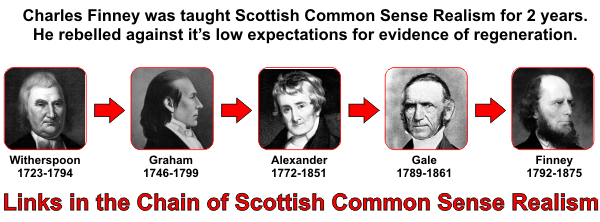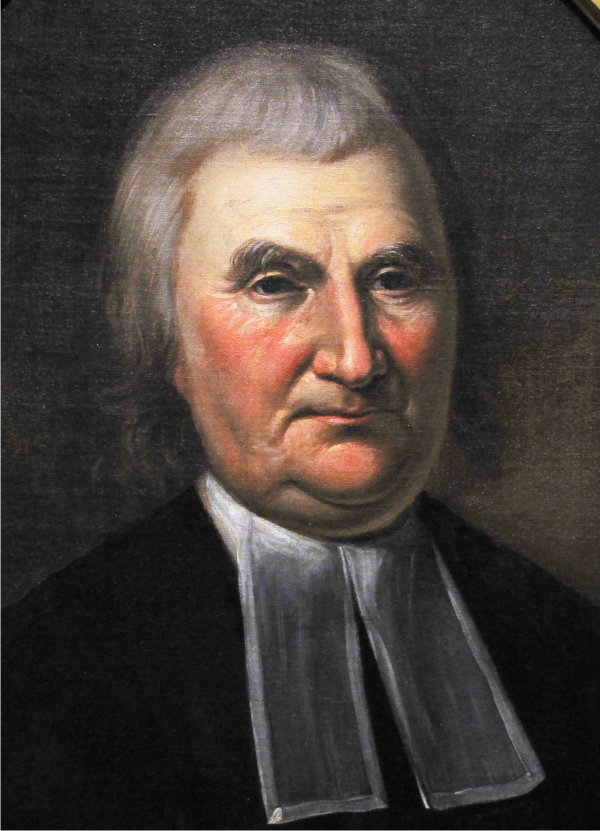How John Witherspoon Relates to
the
Heresy of
Decisional Regeneration
![]()

![]()

If you read John Witherspoon’s view of regeneration, you’ll find the version of Scottish Common Sense Realism he brought to Princeton put regeneration into a subservient position to moral persuasion: “This conviction of the obligation of the divine law, so essentially connected with, or rather so necessarily previous to, an acceptance of the imputed righteousness of Christ, is evidently founded upon the relation of man to God, as a creature to his Creator. This relation then continues, and must continue, unchangeable; therefore the obligation founded upon it must be unalienable; and all those who have once been sensible of it, must continue to be so, unless we suppose them blinded to the knowledge of God as Creator, by the discovery of his mercy in Christ the Redeemer. But this is absurd; for the subsequent relation of a sinner to God, as forgiven and reconciled through Christ, never can take away, nay, never can alter his natural relation as a creature, nor the obligation founded upon it.” No puritan would link illumination of Law Works with regeneration so completely. Sensibility of the obligation of divine law is not evidence of regeneration, and to think so is to make acceptance of the truth of scripture as tantamount to saving faith. This is what Finney rebelled against when he was taught for two years by George Washington Gale, and this is the error that caused the BEST system to be changed to the BIST system after the Civil War. Witherspoon's influence over the evolution of the American New Light Calvinist decision for Christ can not be understated. If the philosophy of Friedrich Nietzsche could be said to be the basis for Nazi ideas of the "power of the will", the theology of Witherspoon was the philosophical influence that resulted in the New Light Calvinist "metaphysical moral influence" decision for Christ. This was the rational for the Inquiry Room changing from BEST system to BIST system after the Civil War, which incidentally, was NOT IN ANY WAY CONNECTED TO CHARLES FINNEY. Charles Finney continued to use the BEST system till the day he died in 1875. Finney was indirectly influenced by Witherspoon though. Witherspoon taught William Graham (1746-1799), and Graham taught Archibald Alexander (1772-1851) Scottish common Sense Realism, and Alexander taught George Washington Gale (1789-1861), and George Washington Gale taught Charles Finney (1792-1875) to prepare him for the ministry. Finney rejected the idea that regeneration was not immediately discernable and questioned the lack of supernatural activity (apart from the energizing of Scripture) of the Holy Spirit inherent in Scottish Common Sense Realism. This rejection caused him to form his own theology more in line with that of Samuel Hopkins that stressed the immediate experience of regeneration. Unfortunately, almost all modem Calvinists do not know that Finney based his expectation on immediate experience of regeneration on a pre determinist premise with consecutional saving faith. If you are serious about understanding how Christian salvation change so quickly, that it, before the Civil War supernatural regeneration and the indwelling of the Holy Spirit to after the Civil War, saving faith as evidenced by believing Scripture, please read the complete text of Witherspoon's Practical Treatise On Regeneration with commentary. Here are 10 FALSE PREMISES of Witherspoon: FALSE PREMISE 1: There is no difference between common and saving grace. FALSE PREMISE 2: There is no difference between common and saving faith. FALSE PREMISE 3: Regeneration is assured if you have common faith in the truth of Scripture. FALSE PREMISE 4: Anyone who believes the gospel with common faith is said to be regenerate. FALSE PREMISE 5: Having common faith in Scriptures (not the Person of God) is the only means of salvation (Man-Mechanical faith). FALSE PREMISE 6:Since there is no change of nature in regeneration, “true” or “sincere” repentance and faith are relative and subjective. FALSE PREMISE 7:Since “true” or “sincere” repentance and faith are relative and subjective, regeneration is also relative and subjective, not objective and absolute. FALSE PREMISE 8: Regeneration is merely a gradual psychological process, not an immediate, supernatural change. FALSE PREMISE 9:Regeneration is merely the moral persuasion of the rational mind. FALSE PREMISE 10: The nature of fallen man is merely polluted, so does not have to be supernaturally replaced.
|